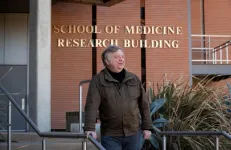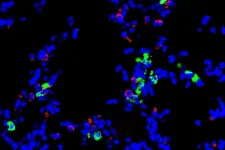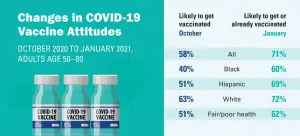(Press-News.org) Delaying second doses of COVID-19 vaccines should reduce case numbers in the near term. But the longer-term case burden and the potential for evolution of viral "escape" from immunity will depend on the robustness of immune responses generated by natural infections and one or two vaccine doses, according to a Princeton University and McGill University study published March 9 in the journal Science.
"Several countries including the United Kingdom and Canada have stated that they will delay second doses of COVID-19 vaccines in response to supply shortages, but also in an attempt to rapidly increase the number of people immunized," said lead author Chadi Saad-Roy, a Ph.D. candidate in Princeton's Lewis-Sigler Institute for Integrative Genomics.
"The original clinical trials of the vaccines, plus subsequent epidemiology, are quite optimistic regarding the efficacy of the first dose," Saad-Roy said. "However, we are still uncertain how the strength and duration of immunity from a single dose -- or the full two-dose course or natural infection, for that matter -- will persist in the longer term."
"These will all impact the dynamics of future outbreaks," said co-author Simon Levin, Princeton's James S. McDonnell Distinguished University Professor in Ecology and Evolutionary Biology and an associated faculty member in the High Meadows Environmental Institute (HMEI).
The researchers used a simple model to project forward the incidence of COVID-19 cases, as well as the degree of immunity of the population, under a range of vaccine dosing regimes and assumptions related to immune responses.
"Given the immunological and epidemiological uncertainties driving these outcomes, simple models are an essential tool to explore future possibilities," said senior author Caroline Wagner, an assistant professor of bioengineering at McGill University.
"The model, for example, allows for the assumption that immune responses after a single dose will be weaker than those following natural infection or two doses," said co-author Andrea Graham, a Princeton professor of ecology and evolutionary biology and associated faculty member in HMEI. "That appears to be consistent with early reports from countries that have rapidly deployed vaccines according to a delayed second-dose schedule."
The study found that one-dose strategies may, as expected, reduce case numbers in the short term by more rapidly immunizing a greater number of individuals. However, if immune responses after one dose are less robust, subsequent epidemic peaks may be larger.
"More optimistically, we find that as vaccine capacity increases, increasing vaccination rates or changing the dosing regime to be closer to the recommended two-dose schedule can mitigate these longer term epidemiological effects, which is important for public health planning," Wagner said.
Another important outcome associated with imperfect immune responses is the potential for viral immune escape. To start addressing this complex issue, the authors adapted an existing simple 'phylodynamic' model for viral immune escape developed by co-authors Bryan Grenfell, the Kathryn Briger and Sarah Fenton Professor of Ecology and Evolutionary Biology and Public Affairs; Oliver G. Pybus, professor of evolution and infectious disease at the University of Oxford; and Edward C. Holmes, an ARC Australian Laureate Fellow and professor at the University of Sydney; along with other colleagues not involved with the current work.
The theory of viral immune escape predicts that in individuals with partial immunity, moderate selection pressure combined with sufficient viral transmission could drive viral evolution. Here, the authors explore this possibility along with a range of other scenarios, including the more optimistic case of minimal potential for adaptation in hosts with waned immunity following one or two vaccine doses.
"At least one variant has already emerged that may be adapted for partial immune escape," Holmes said.
"Simple theory underlines that the evolution and transmission of variants by infected hosts with intermediate levels of immunity may be important," added Grenfell, who is an associated faculty member in HMEI. "Therefore, the strength and duration of immunity, and particularly the effect of these on retransmission, are key parameters to determine."
"Our results are strongly dependent on the robustness of immune responses following one and two vaccine doses, but ultimately these clinical parameters are largely unknown," explained co-author Michael Mina, an assistant professor at the Harvard School of Public Health and Harvard Medical School.
"Moving forward, it will be critical to get a better handle on these in order to make sound public policy decisions," Mina said. "We suggest that randomization of dose intervals early in vaccination campaigns and careful monitoring of viral loads and immune markers in vaccinated individuals as well as those who have had natural infections and their contacts may be important approaches for doing so."
One intuitive finding that the paper emphasizes is that very low rates of vaccine administration may be associated with larger case numbers and, possibly, more elevated potential for viral adaptation.
"This strongly underlines the importance of equitable global vaccine distribution, as immune escape in one location will rapidly spread," said C. Jessica E. Metcalf, an associate professor in ecology and evolutionary biology and public affairs at Princeton and also an associated faculty member in HMEI.
"The models are relatively simple conceptually, but they illustrate the complexities of the problem and highlight the challenges that we still face," said Michael Boots, professor of integrative biology at the UC Berkeley who was not affiliated with the study. "This important piece of work provides a framework that we can use to inform our approach going forward and moreover identifies the key knowledge gaps that we need to address."
INFORMATION:
Other co-authors on the study include Rachel Baker, an associate research scholar in HMEI; Sinead Morris, a postdoctoral research scientist at Columbia University who received her Ph.D. in ecology and evolutionary biology from Princeton; and Jeremy Farrar, director of the Wellcome Trust.
The paper, "Epidemiological and evolutionary considerations of SARS-CoV-2 vaccine dosing regimes," was published online by Science March 9. The work was supported by funds from the Natural Sciences and Engineering Research Council of Canada; the Cooperative Institute for Modeling the Earth System (CIMES) at Princeton University; the James S. McDonnell Foundation; the C3.ai Digital Transformation Institute and Microsoft Corporation; Google; the National Science Foundation; the U.S. Centers for Disease Control and Prevention; and Flu Lab.
Members of the COVID-19 Primary Care Database Consortium explain how the use of big data containing millions of primary care medical records provides an opportunity for rapid research to help inform patient care and policy decisions during the COVID-19 pandemic. Established in April 2020, the Consortium brings together experts in big data, epidemiology, intensive care, primary care and statistics, as well as journal editors, patient and public representatives, and front-line clinical staff from the universities of Oxford, Cambridge, Southampton, Bristol and Nottingham
The consensus statement that the consortium has developed and described in the article aims to facilitate transparency and rigor in methodological approaches, as well as consistency in defining and reporting ...
Members of the Perelman School of Medicine at the University of Pennsylvania and its health system developed and implemented a new model of collaborative care called The Penn Integrated Care (PIC) program. PIC includes a resource center to support intake, triage and referral management and collaborative care services in primary care practices. PIC was created to increase access to and engagement with mental health professionals to improve mental and physical health outcomes. Primary care physicians were able to refer patients with any mental health symptom or condition to PIC. In 12 months, 6,124 unique patients were referred from eight primary care clinics to either the PIC Resource Center or were connected with a mental health professional. ...
RIVERSIDE, Calif. -- Variants of the coronavirus are appearing in different parts of the world, many of them spreading with alarming speed. One contagious variant is the South African, or SA, variant, identified by an international team of researchers, including biomedical scientists from the University of California, Riverside.
"The new COVID-19 variants are the next new frontier," said Adam Godzik, a professor of biomedical sciences in the UC Riverside School of Medicine and a member of the research team that made the discovery. "Of these, the ...
Scientists at Washington University School of Medicine in St. Louis have implicated a type of immune cell in the development of chronic lung disease that sometimes is triggered following a respiratory viral infection. The evidence suggests that activation of this immune cell -- a type of guardian cell called a dendritic cell -- serves as an early switch that, when activated, sets in motion a chain of events that drives progressive lung diseases, including asthma and chronic obstructive pulmonary disease (COPD).
The new study, published in The Journal of Immunology, opens the door to potential preventive ...
New study finds the skyrocketing cost of drugs in U.S. used to treat hookworm and other soil-transmitted parasites increases patient costs, suggests decreased quality of care
A new study finds that the increasingly high prices in the United States of the drugs used to treat three soil-transmitted helminth infections--hookworm, roundworm (ascariasis), and whipworm (trichuriasis)--is not only the major driver for the increase in costs to patients with either Medicaid or private insurance, but it also may have a damaging impact on the quality-of-care patients receive as clinicians shift their prescribing patterns to more affordable yet less-effective medicines covered ...
https://doi.org/10.15212/bioi-2021-0002
Announcing a new article publication for BIO Integration journal. In this article the authors Jingdun Xie, Zhenhua Qi, Xiaolin Luo, Fang Yan, Wei Xing, Weian Zeng, Dongtai Chen and Qiang Li; from Sun Yat-sen University, Guangzhou, Guangdong, China discuss integration analysis of m6A regulators and m6A-related genes in hepatocellular carcinoma (HCC).
N6-Methyladenosine (m6A) RNA methylation of eukaryotic mRNA is involved in the progression of various tumors. This study comprehensively analyzed m6A regulators and m6A-related genes through an integrated bioinformatic analysis, ...
Last fall, nearly half of older adults were on the fence about COVID-19 vaccination - or at least taking a wait-and-see attitude, according to a University of Michigan poll taken at the time.
But a new follow-up poll shows that 71% of people in their 50s, 60s and 70s are now ready to get vaccinated against COVID-19 when a dose becomes available to them, or had already gotten vaccinated by the time they were polled in late January. That's up from 58% in October.
Three groups of older adults with especially high risk of severe COVID-19 -- Blacks, Hispanics and people in fair or poor health - had even bigger jumps in vaccine receptiveness between October and late January.
The poll shows a 20-point jump in just ...
BOSTON - Almost immediately after the first mRNA-based COVID-19 vaccines were authorized for emergency use and were administered to individuals outside of clinical trials, reports of anaphylaxis--a life-threatening whole-body allergic reaction--raised widespread concerns among experts and the public. Now, real world data on vaccinations among employees at Mass General Brigham provide reassurances of the rarity of such serious reactions, and the ability to recover from them. The findings are published in the END ...
Past studies on whether incarcerated people with mental illness are more likely to be placed in solitary confinement have yielded mixed results. A new study examined the issue in one state's prisons, taking into account factors related to incarcerated men and the facilities where they were imprisoned. It found that having a mental illness was associated with a significant increase in the likelihood of being placed in extended solitary confinement.
The study, by researchers at Florida State University (FSU), appears in Justice Quarterly, a publication of the Academy of Criminal Justice Sciences.
"Our findings provide new information on how mental illness shapes experiences for incarcerated men, and more broadly, on how the criminal justice ...
A research team at Johannes Gutenberg University Mainz (JGU) in Germany has developed a completely new, environmentally-friendly electrochemical procedure for producing sulfonamides rapidly and inexpensively. Sulfonamides are used in many drugs including antibiotics and Viagra as well as in agrochemicals and dyes, which makes them an important class of molecules for the pharmaceutical and chemical industries. While to date it has been necessary to use corrosive chemicals, high temperatures, and expensive metal catalysts to produce sulfonamides, the new method requires ...


